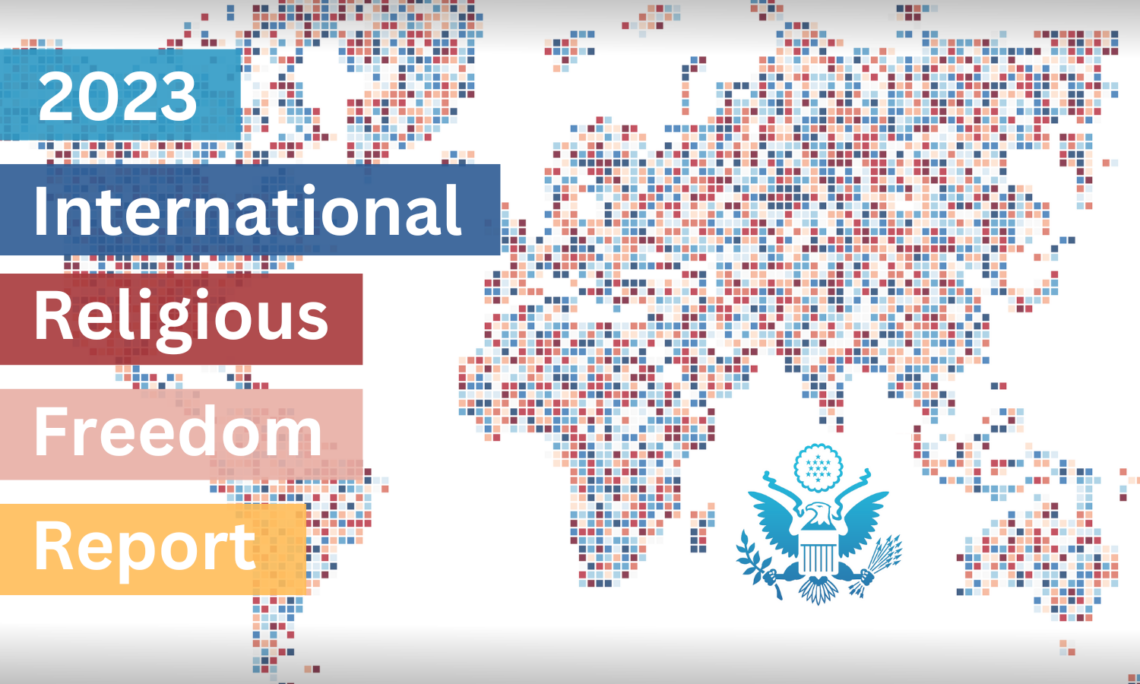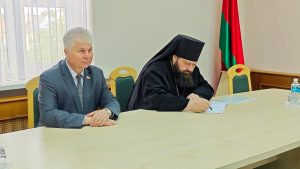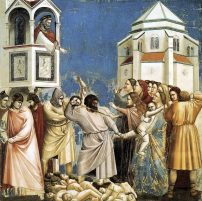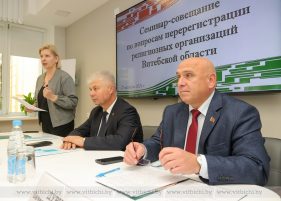2023 Report on International Religious Freedom: Belarus
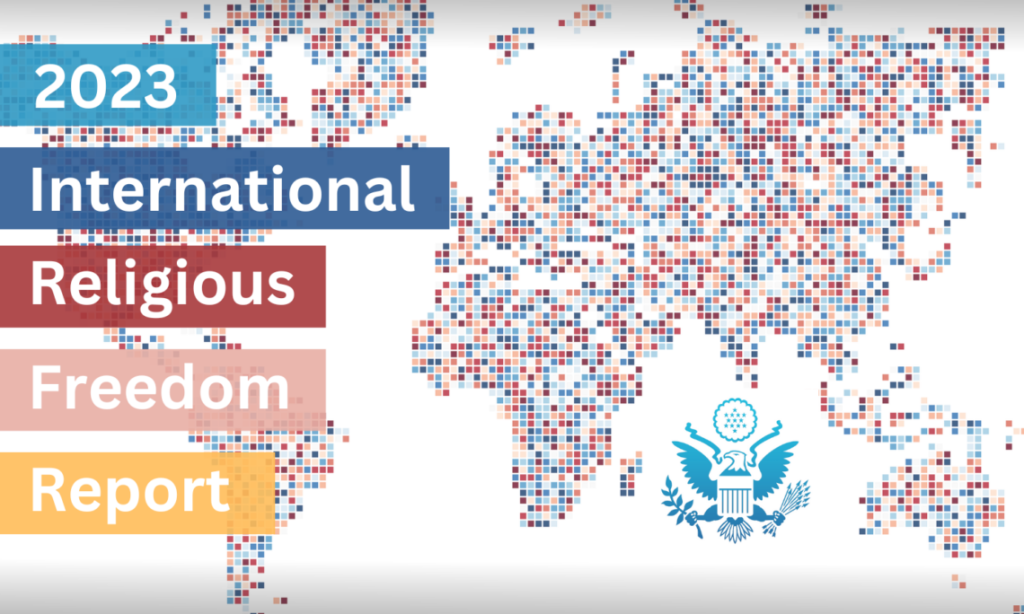

EXECUTIVE SUMMARY
The constitution grants the freedom to profess and practice any religious belief but prohibits religious activities directed against the sovereignty of the state, its constitutional system, and “civic harmony.” A concordat grants the Belarusian Orthodox Church (BOC) rights and privileges not granted to other religious groups, and the law recognizes the “determining role of the BOC” and historical importance of the “traditional faiths” of Catholicism, Judaism, Islam, and evangelical Lutheranism. The law prohibits all religious activity by unregistered groups and requires all registered religious groups to obtain permits to proselytize or hold events outside of their premises, as well as prior approval from the authorities to import and distribute religious literature.
Authorities continued to use laws regulating “mass events” to target members of the clergy and members of religious groups engaged in the prodemocracy movement that emerged following the 2020 fraudulent presidential election, as well as those groups protesting Russia’s invasion of Ukraine. Authorities detained numerous religious leaders in connection with these 2020 and 2022 protests, including a religious education teacher at the Roman Catholic cathedral in Minsk. The teacher remained in pretrial detention at year’s end on criminal charges of inciting religious and social hatred, accused of using the cathedral towers to monitor the movements of security forces and warn protesters. The regime detained religious leaders for posting on social media materials deemed extremist, such as democratic opposition symbols, and leading prayers in support of volunteer fighters defending Ukraine. A law signed in late December and scheduled to take effect in July 2024 mandates religious groups reregister within a year and bans registered religious groups from engaging in political activities or supporting and financing political parties. The new law expands the grounds for shutting down religious communities and organizations, including terrorism, extremism, or acting against the sovereignty of the country. In June, authorities prosecuted and ultimately fined a Baptist pastor for publicly proselytizing without authorization. Human rights organizations said authorities restricted clergy access to prisons and denied pastoral visits to some political prisoners. According to observers, authorities continued surveillance of registered and unregistered religious groups, including through monitoring of social media. In June, Minsk city authorities bulldozed a building formerly owned by the evangelical Christian New Life Church following a years-long dispute with tax authorities. In October, following government accusations that information on the church’s social media accounts regarding the political and social situation in the country was extremist, a Minsk court shut down the church and revoked its registration, a decision upheld by the Supreme Court in December. The Catholic Church of St. Simon and St. Helena in Minsk remained closed following a 2022 fire that church leaders said did not do extensive damage; a Minsk city official said in October that repair and restoration work would start in 2024, after which the government would decide on the group’s request to allow reopening of the church.
According to media reports, on December 20, Plenipotentiary Representative for Religious and Nationality Affairs Alyaksandr Rumak and head of the Ideology Department of the Minsk city executive committee Volha Chamadanava warned the BOC Diocese of Minsk clergy against engaging in political activity, demonstrating any opposition or extremist symbols in churches, and praying for the victory of Ukraine, threatening them with criminal prosecution.
In the wake of the Israel-Hamas conflict, there were numerous antisemitic comments circulating on social media. Following the arrival of a November evacuation flight from Israel, hundreds of commentators urged the government against welcoming the evacuees and questioned the loyalty and patriotism of those evacuated. Other social media commentary included derogatory references to the Jewish identity of Ukrainian President Volodymyr Zelenskyy. An interreligious working group comprising the largest religious groups organized multiple seminars on issues related to religion and society.
The Charge d’Affaires and other U.S. embassy personnel engaged with religious leaders and civil society activists on religious freedom issues, including registration of religious communities, state pressure on clergy, freedom to express and practice religious beliefs, freedom of expression for clergy who participated in activities authorities considered political, and antisemitism. The Chargé and other embassy personnel met with Jewish groups to discuss antisemitism and the preservation of Jewish cultural heritage and participated in a November event in Minsk commemorating Holocaust victims. The Chargé and other embassy representatives also engaged Orthodox Christians, Roman Catholics, Protestants, and other groups as well as civil society activists, to learn about their religious activities and to discuss the regime’s actions affecting the exercise of religious freedom.
Section I.
Religious Demography
The U.S. government estimates the total population at 9.5 million (midyear 2023). According to a 2016 survey by the state Information and Analytical Center of the Presidential Administration (the most recent data available), approximately 53 percent of the adult population belongs to the BOC, 6 percent to the Roman Catholic Church, 8 percent is atheist, and 22 percent answered “uncertain.” Smaller religious groups together constituting approximately 2 percent of the population include Jews (approximately 30,000), Muslims (approximately 20,000), Greek Catholics (members of the Belarusian Greek Catholic Church), Old Believers (priestist and priestless), members of the Belarusian Autocephalous Orthodox Church and other Orthodox Christian groups, Lutherans (approximately 1,500), Jehovah’s Witnesses, Apostolic Christians, Presbyterians and members of other Protestant groups, Armenian Apostolics, Latin Catholics, members of the International Society of Krishna Consciousness, Baha’is, members of The Church of Jesus Christ of Latter-day Saints, and Buddhists. Most ethnic Poles, who constitute approximately 2 percent of the population, are Roman Catholic.
Section II.
Status of Government Respect for Religious Freedom
LEGAL FRAMEWORK
The constitution grants individuals the freedom to profess or not to profess and to spread any religious belief and to participate in acts of worship and religious rituals and rites that are not prohibited by law. It stipulates all faiths are equal before the law. The constitution states relations between the state and religious organizations shall be regulated by the law “with regard to their influence on the formation of the spiritual, cultural, and state traditions of the Belarusian people.” It prohibits activities by religious groups that are directed against the country’s sovereignty, its constitutional system, and “civic harmony”; involve a violation of civil rights and liberties; “impede the execution of state, public, and family duties” by its citizens; or are detrimental to public health and morality. It also prohibits the creation of political parties or other associations, or political activities that propagate religious hatred. The constitution states the law shall determine conditions for exemption from military service and the performance of alternative service as a substitute. It stipulates the state may grant asylum to persons persecuted in other states for their religious beliefs.
The Office of the Plenipotentiary Representative for Religious and Nationality Affairs (OPRRNA), subordinate to the Council of Ministers, regulates all religious matters. The office takes part in drafting and implementing state policies on religious affairs, enforces and protects religious rights and freedom, monitors activities of religious organizations and compliance with their charters, regulates relations between the state and religious organizations, liaises with state agencies and religious organizations upon their request, promotes tolerance and mutual understanding among religious organizations of various faiths and nationalities, and researches dynamics and trends in interdenominational relations to prevent “religious exclusiveness” and disrespectful treatment of religions and nationalities. The executive committees of the country’s six oblasts (regions) and Minsk city have departments for ideology and youth engagement that include coverage of religious issues. These departments are independent from OPRRNA but share information with it. The President appoints and may dismiss the plenipotentiary representative heading OPRRNA, based on a nomination from the Council of Ministers.
The law recognizes the “determining role” of the BOC, an exarchate (affiliate) of the Russian Orthodox Church, in the development of the traditions of the people, as well as the historical importance of four other religious groups that the government commonly referred to as “traditional” faiths: Roman Catholicism, Judaism, Islam, and evangelical Lutheranism. The law does not consider as traditional faiths newer religious groups or older groups, such as the priestless Old Believers, Greek Catholics, and the Calvinist churches, which have roots in the country dating to the 17th century.
A concordat between authorities and the BOC provides the church with autonomy in its internal affairs, freedom to perform religious rites and other activities, and a special relationship with the state. The concordat recognizes the BOC’s “influence on the formation of spiritual, cultural, and national traditions of the Belarusian people.” Although the concordat states that it does not limit the religious freedom of other religious groups, it calls for authorities and the BOC to combat unnamed “pseudo-religious structures that present a danger to individuals and society.” The BOC, unlike other religious communities, receives state subsidies pursuant to presidential orders. In addition, the BOC possesses the exclusive right to use the word “orthodox” in its title and to use as its symbol the double-barred image of the Cross of Saint Euphrosyne, the country’s Orthodox patron saint.
The concordat serves as the framework for at least a dozen cooperation agreements between the BOC and individual state agencies, including with the Ministries of Defense, Healthcare, and Information. There is also an agreement with the Ministry of Education through 2025 that provides for joint projects for the “spiritual and moral education” of students based on BOC traditions and history. During the year, the BOC signed new five-year cooperation agreements with the Sports and Tourism Ministry and the Ministry of Natural Resources and Environmental Protection.
There are no explicit laws on either hate speech or hate crimes, but the law criminalizes inciting racial, national, religious, or other social hatred or discord based on racial, national, religious, linguistic or other social affiliation, penalties for which range from a fine to five years in prison. Such actions connected with violence or committed by an official using his or her powers are punishable with three to 10 years’ imprisonment and, if committed by a group causing severe consequences or deaths, punishable by five to 12 years in prison.
The law on combating extremism prohibits activities of religious organizations to plan, organize, prepare, and commit encroachment upon independence, territorial integrity, sovereignty, constitutional order, and public security by inciting religious enmity, by organizing mass riots or other actions grossly violating public order based on religious hostility, and by propagating language of exclusivity, superiority, or inferiority of citizens based on their social, racial, national, religious, or linguistic affiliation. The law also bans establishing and running groups aiming to conduct extremist activities, including based on the grounds of racial, national, religious hostility or discord, and to justify Nazism, punishable from three to seven years in prison and up to 10 years if committed by an official.
The criminal code defines as an aggravating factor committing a crime based on racial, national, or religious hostility or discord. It also criminalizes genocide, including based on religious grounds, with punishment ranging from 12 years’ imprisonment to the death penalty, as well as murder and crimes against humanity, including deportation, extrajudicial executions, kidnapping, torture and violence based on the civilian population’s religion. The punishment for the latter ranges from seven years in prison to the death penalty.
The law establishes three tiers of registered religious groups: religious communities, religious associations, and national religious associations. Religious communities must include at least 20 persons older than 18 who live in one or several adjoining areas. Religious associations must include at least 10 religious communities, and one of these communities must have been active in the country for at least 20 years. National-level religious associations may establish regional and local religious associations. National religious associations earn recognition only when they comprise active religious communities in at least four of the country’s six oblasts.
According to OPRRNA data, as of January 1, there were 25 religious faiths and denominations registered in the country, encompassing 3,417 religious communities and 173 religious associations, monasteries, missions, brotherhoods, sisterhoods, and schools. The BOC has 1,733 religious communities, 15 dioceses, six schools, 36 monasteries, one mission, 15 brotherhoods, and nine sisterhoods. The Roman Catholic Church has four dioceses, six schools, 11 missions, nine monasteries, and 500 communities. Protestant religious organizations of 13 denominations encompass 1,040 religious communities, 21 associations, 22 missions, and five schools. There are 34 registered religious communities of Old Believers. There are three Jewish religious associations – Orthodox, Chabad-Lubavitch, and Reform Judaism – comprising 51 communities. There are 24 registered Muslim religious communities – 23 Sunni and one Shia.
The national religious associations are the BOC, Roman Catholic Church, Old Believers Church, Union of Evangelical Christian Baptists, Union of Christians of Evangelical Faith, Confederation of Christian Seventh-day Adventists, Association of New Apostolic Churches, Union of Full Gospel Christian Churches, Association of Jehovah’s Witnesses, Union of Evangelical-Lutheran Churches, Jewish Religious Union, Association of Jewish Religious Communities, Union of Reform Judaism Communities, Muslim Religious Association, Spiritual Board of Muslims, and the Religious Association of Baha’is.
To register, a religious community must submit an official application containing the following information: a list of its founders’ names, places of residence, citizenship, and signatures; copies of its founding statutes; the minutes of its founding meeting; and confirmation from regional authorities of the community’s right to occupy or use any property referenced in its founding statutes. A religious community not previously registered by authorities must also submit information regarding its beliefs. The law stipulates authorities may take up to six months to review a new registration application, which includes an evaluation of the religion by a state-appointed religious commission of experts. The commission evaluates the fundamental teachings of the religious group, as well as its rituals, practices, history, and forms and methods of activities; welfare and charitable services; proselytizing and missionary activities; approaches toward marriage and family; educational activities; attitudes toward health care; and compliance with legal requirements. In addition, the community must submit any texts written by its founder or considered sacred by the followers of the religion, information concerning prohibitions on clergy or adherents, a list of countries where the religion is widely practiced, and a list of countries officially recognizing the religious group. It also must submit information regarding countries that have refused to recognize the religion and information on court cases against its followers in other countries.
Regional authorities, as well as Minsk city authorities or local municipal authorities (for groups outside of Minsk), review all registration applications. Permissible grounds for denial of registration include failure to comply with requirements for establishing a community, an inconsistent or fraudulent charter or other required document, violations of the procedures to establish religious organizations, and a negative evaluation by the state-appointed religious commission of experts. Communities may appeal refusals in court.
To register as a religious association or national religious association, a group must provide an official application with a copy of the founding statutes, a list of members of the managing body with biographical information, proof of permission for the association to be at its designated location, and the minutes from its founding congress. Religious associations have the exclusive right to establish religious educational institutions and to organize cloistered and monastic communities. All applicants must submit forms to establish religious associations and national associations to OPRRNA, which has 30 days to respond. Grounds for refusal are the same as for religious communities, except they also include failure to comply with requirements for establishing an association rather than a community. Applicants may appeal in court refusals or a failure by OPRRNA to respond within the 30-day period.
The law confines the activities of religious communities and associations to the jurisdictional area where they are registered. The law permits state agencies in charge of registration to issue written warnings to a registered religious group for violating any law or undertaking activities outside the scope of responsibilities in the group’s charter. Authorities may apply to a relevant court, depending upon jurisdiction, to shut down the group if it has not ceased the illegal activity outlined in the written warning within six months or if the activity is repeated within one year of the warning. Authorities may suspend activities of the religious group pending the court’s decision. The law does not contain a provision for appealing a warning or suspension.
The law prohibits all religious activity by unregistered groups and criminalizes activities conducted on behalf of unregistered groups, which are punishable by up to two years in prison.
The housing code permits registered religious groups to hold services at residential premises if local authorities grant permission. Local authorities must certify that the premises comply with a number of regulations, including fire safety, sanitary, and health code requirements. Authorities do not grant such permission automatically, and the law prohibits religious groups from holding services in private residences without prior permission from local authorities, who may approve residential worship subject to revocation.
By law, all religious groups must obtain permits to hold events outside of their premises, including when proselytizing.
The law penalizes organizing and participating in unauthorized gatherings, the announcement of an intention to hold a mass event before securing official authorization, training protesters, financing public demonstrations, or soliciting foreign assistance “to the detriment” of the country. Included in the definition of “mass event” are religious events held in places not specifically intended for this purpose, whether outdoors or indoors. The law requires organizers to request permission from authorities to hold a mass event, including those involving religious groups, at least 15 days before the event. Some violations of the law prohibiting unauthorized mass events may be punishable by up to three years in prison. Authorities must inform organizers of a denial no later than five days before the event. In some cases, a first violation of the law within a year’s time involves an administrative penalty of a fine or detention up to 15 days, while if there is a second or further violation during that period the person may be imprisoned up to three years.
Authorities have a system of reimbursements for security, medical, and cleaning services required from organizers of mass events, including religious events held outside of religious premises and sites, rallies, competitions, cultural events, festivals, concerts, and similar occasions. Authorities cover costs associated with events that are officially sponsored at the local and national levels. The law requires organizers to sign contracts for services before applying for a permit to hold a mass event and reimburse all costs within 10 days.
The law requires all religious groups to obtain prior approval from authorities to import and distribute religious literature. The approval process includes official examination of the documents by state-appointed religious studies experts.
Although there is no law providing for a systematic restitution or compensation process for property, including religious property, seized during the Soviet and Nazi periods, claimants may apply for restitution to local authorities. The law on religion specifically bans the restitution of, or compensation for, seized property that is being used for cultural or sports purposes.
The law permits associations and national associations to establish schools to train clergy but does not permit religious communities to do so.
The law permits only registered religious groups that are members of national religious associations to organize extracurricular religious activities at educational institutions. The law states the national religious association must first conclude an agreement on cooperation with the Ministry of Education; the BOC is the only religious group to have such an agreement. Even with such an agreement in place, students who wish to participate in voluntary “moral, civic, and patriotic education” in collaboration with religious groups must either provide a written statement expressing their desire to participate or secure their legal guardians’ approval. According to the law, “Such education shall raise awareness among the youth against any religious groups whose activities are aimed at undermining Belarus’s sovereignty, civic accord, and constitutional system or at violating human rights and freedoms.” Middle school students have the option of voluntary weekly classes on “Spiritual and Moral Culture and Patriotism,” which focus on Russian Orthodox Church history and traditions.
The law prohibits religious groups from conducting activities in any school without identifying themselves, regardless of whether there is an agreement with the Ministry of Education. It also prohibits visits from representatives of foreign religious groups; missionary activities; collections of donations or fees from students for religious groups or any charity; distribution of religious literature, audio, video, and other religious materials; holding prayer services, religious rituals, rites, or ceremonies; and placing religious symbols or related items at educational institutions.
The law does not allow private religious elementary, junior, or senior high schools or homeschooling for religious reasons.
The law establishes penalties ranging from fines to five years in prison for failure to fulfill mandatory military service, with an exemption for conscientious objectors for religious reasons. The law allows alternative civilian service for conscientious objectors. Military service typically lasts from six to 18 months; alternative service may last up to 36 months. By law, individuals who evade alternative civilian service may face up to five years in prison.
Only registered religious associations may apply to OPRRNA for permission to invite foreign clergy to the country. OPRRNA must grant permission before foreign clergy may serve in local congregations, teach or study at local institutions, or participate in charitable work. Authorities generally grant such permission for a period of one year, and they may reduce or extend permissions. OPRRNA has 30 days to respond to requests for foreign clergy permits (religious visas) and may deny requests without explanation. If OPRRNA does not respond, it does not grant permission for a permit. There is no provision for appeals.
By law, authorities permit foreign missionaries to engage in religious activity only in the territorial area where their religious association is registered. Transfers of foreign clergy within a religious association, including from one parish to another, require prior permission from authorities. By law, foreigners may not lead religious groups. Authorities may reprimand or expel foreign citizens who legally are present in the country for nonreligious work if they lead any religious activities. Law enforcement agencies on their own initiative or in response to recommendations from other state agencies, such as the security service, may require foreign clergy to depart the country – a decision that is beyond appeal.
The country is a party to the International Covenant on Civil and Political Rights.
GOVERNMENT PRACTICES
Abuses Involving Violence, Detention, or Mass Resettlement
Throughout the year, according to local and international civil society and human rights groups, authorities continued to use legislation banning unauthorized mass events and extremist activities to target those who took part in the prodemocracy movement following the 2020 presidential election widely criticized as fraudulent. Those arrested and detained included members of the clergy and churchgoers. Authorities used the same legislation against members of the clergy and religious groups who peacefully protested Russia’s war against Ukraine. Because religious and political activity were often linked, it was difficult to categorize many such incidents as being solely based on religious identity or affiliation.
Authorities continued to harass and detain individuals, including clergy, who expressed disagreement with the Lukashenka regime, criticized violence by agencies under its control, or criticized Russia’s war against Ukraine. According to human rights groups, security officers routinely seized detainees’ mobile phones to guide interrogation based on their messages, social media use, contacts, videos, and photographs, all of which officers often used as a pretext to charge detainees with extremist or other opposition activities characterized as criminal offenses. After sustained harassment and threat of punishment by the regime, many religious leaders and clergy reportedly chose to refrain from commenting publicly or online concerning the regime’s actions or otherwise left the country in self-imposed exile. Authorities stated remarks by religious leaders constituted interference in what they deemed to be political affairs.
According to the independent Belarus-focused monitoring group Christian Vision, a part of the domestic democratic movement, police opened a criminal case in July on charges of inciting religious and social hatred against Uladzislau Beladzed, a religious education teacher at the Roman Catholic Cathedral of the Blessed Virgin Mary in Minsk. Authorities stated that Beladzed had sheltered some protesters from the 2020 prodemocracy demonstrations in the cathedral. The protesters at that time had used the cathedral towers to monitor the movements of security forces and warn other protesters and were later met with force by the security forces. Authorities also accused Beladzed of criticism of police in his online commentary. The Christian Vision report stated that following Beladzed’s arrest on May 31, police beat him, exposed his personal correspondence and photographs, and commented publicly on his sexual identity. The report said police forced him to confess to the allegations against him in a video posted in the police’s Telegram channel. After his arrest, authorities sentenced Beladzed to up to 30 days of detention on additional charges of disseminating extremist materials. He remained in pretrial detention at year’s end. Independent media also reported that on July 14, security forces searched the premises of the Cathedral of the Blessed Virgin Mary in connection to the criminal charges against Beladzed and used violence against at least two local clergy, briefly detaining and interrogating them. While police did not arrest them, the two Catholic priests left the country, fearing further criminal prosecution.
On January 1, police in Minsk detained BOC priest Dzianisi Karastsyaleu for praying for the defenders of Ukraine at a New Year’s service in the Joy of All the Sorrowful Icon of the Mother of God Church. A progovernment blogger and activist reported him to police, and on January 4, BOC Metropolitan Veniamin banned the priest from further religious services due to his actions to “confuse parishioners.”
On February 1, police arrested New Earth Baptist church elder Andrei Mamoika and his spouse Vera on charges of organizing and participating in “action grossly violating public order” after photographs of their participation in the 2020 protests were published online. On April 20, a Minsk district court sentenced both to two and one-half years of house arrest.
On April 20, authorities in Novalukoml arrested local evangelical Christian pastor Alyaksandr Zaretski and sentenced him to 15 days in detention for posting commentary deemed to be related to extremist materials on social media. A local court convicted him on similar charges for reposting what authorities deemed to be extremist content on Radio Liberty and other materials, sentencing Zaretski to an additional 15 days of arrest.
On May 25, authorities in Vitebsk Oblast detained at least three priests: Vyachaslau Adamovich of the Roman Catholic parish of the Holy Virgin Mary in Idolta, Greek Catholic priest Alyaksandr Shautsou in Polatsk, and Andrei Kulik of the Roman Catholic parish of the Assumption of the Blessed Virgin Mary parish in Miyory. Shautsou was sentenced to 15 days in jail for reposting extremist materials of the opposition news resource Charter-97 on social media after his computer equipment was confiscated. On June 2, a court in Polatsk convicted Shautsou on similar charges and sentenced him to an additional 30 days in jail. Adamovich received a sentence of seven days in jail for disseminating extremist materials and participating in mass events for subscribing to extremist materials and posting democratic opposition symbols on social media. Kulik was reportedly held in pretrial detention for three days and released without charges in response to similar allegations.
On August 14, officers of the Interior Ministry’s Main Directorate for Combating Organized Crime and Corruption arrested pastor of the New Life Church Vyachaslau Hancharenka and his son-in-law Ilya Budai and searched Hancharenka’s residence. The two were convicted of resisting orders by officials on duty and minor hooliganism and sentenced to 10 and five days in jail, respectively, on August 15.
Several independent media sources reported on November 24 that authorities had opened a criminal case against Roman Catholic priest Henrykh Akalatovich of Saint Joseph Church in Valozhyn on charges of treason. While there was no information regarding allegations against him in the case, sources from his parish said Akalatovich, who remained in pretrial detention at year’s end, required constant medical care and treatment due to cancer and other medical problems.
Abuses Involving the Ability of Individuals to Engage in Religious Activities Alone or In Community with Others
Protestant groups said they remained concerned regarding authorities’ ability to prosecute unregistered religious organizations, although there were no reports authorities did so during the year.
Christian groups continued to state the registration requirements for religious groups remained complex and difficult to fulfill, which they said restricted their activities, suppressed freedom of religion, and legalized administrative penalties such as fines against individuals for their religious beliefs while the groups were unregistered. Authorities’ guidelines for evaluating registration requests remained sufficiently broad and their application arbitrary, they said, to give authorities a pretext for denying requests from disfavored groups. According to human rights observers, some registration attempts during the year were successful while others were not. They noted that some religious communities were delaying applications pending expected amendments to the law in 2024.
Religious groups labeled as “nontraditional” by authorities continued to state the procedure for registering their communities and using residential premises for religious gatherings remained cumbersome and arbitrarily applied.
Some minority religious groups stated they did not apply for registration because their members feared harassment by authorities and did not want to submit their names, as required by the application process.
Sources stated unregistered religious groups continued to maintain a low profile because of fear of prosecution and perceived hostility by the regime. Some registered religious communities said they were reluctant to report restrictions on their activities because they feared drawing additional scrutiny on their members.
On December 30, the Lukashenka regime enacted a law on the freedom of conscience and religious organizations, scheduled to become effective on July 4, 2024, mandates that religious communities and groups reregister with authorities within one year. The law recognizes the special role of the BOC and the Catholic Church in the country’s history and culture along with the Evangelical Lutheran Church, Judaism, and Islam. Under the law, all religious organizations, communities, monasteries, missions, and educational entities will have to apply for new registration and resubmit their charters. Church leaders must be citizens, permanently reside in the country, and may not be designated as extremists or terrorists. The law bans registered religious groups from engaging in political activities or supporting and financing political parties, including the use of religious property for political aims. The new law, once effective, will expand grounds for shutting down religious communities and organizations, including terrorism, extremism, or acting against the sovereignty of the country, its domestic and foreign policy, its constitutional system, and civil harmony.
According to human rights activists, prison administrators selectively delayed or arbitrarily denied clergy visits for certain detainees, especially political prisoners. Many prisons maintained designated Orthodox religious facilities served by BOC clergy, but political prisoners were often prohibited from visiting them. Some prison administrations selectively allowed different Protestant denominations to hold religious meetings for inmates.
On April 3, Minsk city authorities declined a petition from the Roman Catholic Saint Simon and Helena Church (also known as the Red Church) to hold an April 9 Easter service on the grounds of the parish in downtown Minsk. The church remained closed by authorities following a September 2022 fire in an annex building. Deputy Mayor Artsyom Tsuran stated that the premises could not be used until repair works finished and that the Church’s request did not comply with regulations on holding mass events.
Authorities continued attempts to censor the pan-Christian hymn “Mahutny Bozha” (Almighty God) and harass and punish religious leaders, clergy, event organizers, and laypeople who sang or allowed or supported the singing of the hymn. The hymn became linked to the country’s post-Soviet national revival in the early 1990s, when it was proposed (unsuccessfully) as the national anthem, and it had been sung routinely by both religious communities and prodemocracy opposition individuals since then. After the 2020 presidential election, civil society and the prodemocracy movement adopted it as an unofficial anthem and prayer, including during protests.
According to observers, authorities continued surveillance of registered and unregistered religious groups, including monitoring the social media accounts of clergy members. The sources stated “ideology officers” and other representatives of the Lukashenka regime continued to monitor the activities of members of unregistered and registered religious groups, including in their workplaces, although there were no reports of prosecutions based on this type of surveillance.
Authorities, including security forces, reportedly continued to hold occasional “informal talks” with leaders and members of religious groups to learn about their activities. According to religious leaders, state security officers also continued to attend religious services of registered nontraditional Protestant communities to conduct surveillance, which group members described as intimidation and harassment. According to these religious leaders, security officials monitored religious groups for activities or speech perceived as indicating support for the opposition or dissatisfaction with authorities.
Religious groups, especially Protestants and Jehovah’s Witnesses, continued to report they remained cautious about proselytizing and distributing religious materials due to their perceptions that they could face intimidation or punishment, as proselytization without prior authorization was considered an unsanctioned mass event, and hence illegal.
According to media accounts, the BOC was free to proselytize without restrictions on television and in print media as well as in public spaces.
On April 28, the New Life Church stated in a social media post that a Minsk district court had fined seven young evangelical Christians, including five members of the church, up to 3,700 rubles ($1,100) each for proselytizing on April 15 – the day before Easter – in central Minsk. Police detained the group, transported them to a local precinct, questioned them, charged them with violating mass events regulations, and released them pending trial, which had not commenced at year’s end.
According to the international religious freedom nongovernmental organization Forum 18, on June 1, police in the town of Drahichyn arrested local unregistered Baptist pastor Uladzimir Burshtyn and charged him with violating mass events regulations. At his closed trial the next day, the court fined him 555 rubles ($170). Charges against Burshtyn concerned actions by him, his fellow parishioners, and musicians demonstrating their faith in Drahichyn streets on May 27, which involved singing and distributing religious literature. Police halted the event and questioned all participants. On July 27, a prosecutor summoned Burshtyn and warned him against proselytizing, threatening him with criminal prosecution for violating the laws on inciting religious and social hatred.
According to anecdotal evidence and independent media reports, clergy from religious groups labeled by authorities both as traditional and nontraditional opted for self-censorship and avoided discussing political repression or Russia’s war against Ukraine in their sermons and during services.
On February 28, the Polish Foreign Ministry issued a statement condemning the country’s government for forcing the Roman Catholic Blessed Virgin Mary of the Rosary Church in the village of Soly to remove a mural titled “Miracle on the Vistula.” The ministry said the removal constituted “the destruction of Polish cultural heritage, an integral part of Belarusian history, in an undignified and unacceptable way.” In December 2022, local authorities and national officials noted the mural featured the 1920 Battle of Warsaw during the Soviet-Polish war, in which Soviet forces were defeated, and said it incited ethnic and religious hatred, claiming that Poland sought to reclaim former Polish territory in western Belarus.
On October 11, independent media reported clergy of the BOC Holy Intercession Cathedral in Hrodna removed at least two icons depicting martyrs who died at the hands of Bolshevik forces in the early 20th century. According to a local progovernment Telegram channel, the icons were removed for promoting “unacceptable scenes of violence and hostility in such a godly place.” The channel also stated “the faces of saints should inspire positive emotional experiences and promote correct ethical and moral education.” The icons depicted priests who had been killed for their faith as well as their killers, including Red Army soldiers and Soviet police in uniform.
According to Christian Vision, on December 20, Plenipotentiary Representative for Religious and Nationality Affairs Alyaksandr Rumak and head of the Ideology Department of the Minsk city executive committee Volha Chamadanava convened a meeting with the BOC Diocese of Minsk clergy to warn them against engaging in political activity, demonstrating any opposition or extremist symbols in churches, and praying for the victory of Ukraine, threatening them with criminal prosecution. Chamadanava also instructed the clergy to update their parishes’ websites to demonstrate more support of the government and its activities.
In general, communities did not report impediments to purchases or rentals of nonsanctioned places of worship. Some religious communities with outstanding property cases, such as the Roman Catholic Red Church in Minsk, continued to engage with authorities and the legal system to resolve them. After a fire in one of its annexes in September 2022, authorities banned the Red Church from using its church building, long subject to property disputes between the regime and the Catholic Church since Soviet times. Authorities attributed the September fire to electrical problems, which the church disputed; the church also contested the decision of authorities to keep the church closed after the fire, stating the level of damage did not warrant closure. On October 26, the deputy chair of the Minsk city executive committee said at a press conference that repair and restoration work would start at the church in the first quarter of 2024, after which the government would decide on reopening the building.
Converting residential property for religious use remained difficult. Protestant groups stated they continued to face more severe consequences than other groups because they were less likely to own religious facilities, and that they could not apply for permission to conduct religious activities in private homes because residences were too small to accommodate their numbers or communities remained unregistered due to the small number of their members.
On June 20, Minsk city authorities bulldozed the New Life Church building, which the church had purchased and used for services until its eviction in 2021 in the wake of a long dispute with the regime regarding payment of taxes. At the beginning of the year, the church stopped holding services in the parking lot of the building, which it had done in protest of the eviction, after authorities continuously warned senior pastor Vyachaslau Hancharenka that parishioners would face arrest, stating the services were illegal and neighborhood residents had complained of the unsanctioned gatherings. While the church’s leadership continued to hold online services, including on its YouTube channel, the Minsk and Maladzechna District Courts declared in August that materials on the church’s social media channels, including its webpage and its Instagram, YouTube, and Facebook accounts, were extremist, citing materials the courts stated contained deliberately false information on the political and social situation in the country and that incited social and religious hatred. Several New Life Church videos and publications included condemnations of the 2020 postelection police use of violence against protesters and democratic activists and subsequent actions against the regime’s opponents. On October 17, a Minsk district court issued a formal ruling to shut down the church, depriving it of formal registration. On December 12, the Supreme Court upheld the decision of the district court, and there was no further avenue for appeal.
According to media reports, school administrators continued to cooperate with the BOC but not with other religious groups, based on the BOC’s concordat with the regime. School administrators continued to invite BOC priests to lecture to students, organize tours of church facilities, and participate in BOC festivities, programs, and humanitarian projects.
The government continued to allocate funds to cover salaries of professors and employees, as well as stipends for students at BOC seminaries. As in previous years, Protestant groups and the Roman Catholic Church said their schools did not receive any financial support from authorities.
In compliance with the BOC cooperation agreement with the Education Ministry and various educational institutions, a coordination council, composed of Education Minister Andrei Ivanets, BOC Metropolitan Veniamin, and other senior officials, met on August 15 to discuss development and implementation of cooperation programs. The meeting reportedly focused on expanding extracurricular educational opportunities and uniting them with spiritual efforts in educating children and youth and shaping their moral principles with the BOC’s direct engagement.
Abuses Involving Discrimination or Unequal Treatment
Unlike other religious groups, the BOC continued to participate in many state-sponsored public events, such as rallies or celebrations, without the need to seek prior approval from authorities. Regional authorities and state-run companies often included BOC representatives in their events.
Authorities continued to permit the BOC to collect charitable donations in public venues as well as on its religious property. While the law does not restrict other religious groups from soliciting donations in public, representatives of these groups said authorities continued to limit their fundraising activities to their own places of worship or other properties. The groups said they faced harassment and possible detention if they tried to seek donations at other locations.
Some BOC leaders amplified Russia’s propaganda on the war on Ukraine. In a January 24 interview to his eparchy’s website, BOC Archbishop of Navahrudak Huriy said he supported the resurrection of “the triune Russia” and charged the West and Ukraine with attacking Orthodoxy and “everything Russian.” He condemned Ukraine for “destroying a true canonical church” and promoting neopaganism of an “openly demonic nature.”
In his sermons and public appearances during the year, BOC Archpriest and rector of the Saint Elizabeth Monastery in Minsk Andrei Lemiashonak expressed gratitude to the government for its facilitating Russia’s war against Ukraine and continued to encourage his monastery’s charitable activities, support, and donations towards Russian troops in Donbas.
Religious groups said the regime continued to apply visa regulations inconsistently, which affected the ability of foreign missionaries to live and work in the country, and the visa application process remained burdensome. Officials required all foreign clergy working in the country to obtain religious permits to serve at religious institutions and conduct religious duties.
Roman Catholic clergy continued to state that foreign priests faced multiple challenges, including a lengthy approval process before obtaining permission to celebrate Mass, and that officials often issued visas for only three- to six-month authorizations.
Other Developments Affecting Religious Freedom
During the year, the Jewish community and foreign donors worked with local authorities to erect more than one dozen privately funded monuments and plaques and to restore memorials commemorating victims of the Holocaust at sites of mass killings in Vitsebsk, Mikhalishki, Ezerysche, Ruzhany, Slonim, and other locations in the country.
In August and September, courts in Miyory, Vitsebsk, and Lida declared Christian Vision’s social media and messenger groups to be extremist for their independent monitoring of religious freedom abuses in the country, subjecting subscribers and those engaging in such actions as likes, reposts, and shares of Christian Vision material to fines and up to 15 days’ detention.
On November 17, the Defense Ministry reported that as of November 1, it established a new position of religious instructor in the armed forces. According to the ministry, clergy with relevant spiritual education who were ordained and fit for conscription would be appointed as instructors, tasked with leading spiritual and moral education and meeting the spiritual and religious needs of military personnel. The ministry also reported that as of November 17, six clergymen served as instructors.
Section III.
Status of Societal Respect for Religious Freedom
Antisemitic comments appeared on social media, online chat channels, and in the comment sections of local online news articles, although it was unclear whether all comments were posted by persons in the country. For example, several state-owned television channels covered a commercial evacuation flight from Israel to Belarus on November 6, which carried more than 115 Belarusian citizens. Hundreds of commentators urged the regime against welcoming the evacuees and argued to send them to Gaza, saying, for example, “they should be held liable for their crimes,” “they betrayed their country [of Belarus] by leaving it and can no longer be loyal and patriotic residents,” and generally questioning their integrity.
Other social media commentary was related to the war in Ukraine, including derogatory references to the Jewish identity of Ukrainian President Volodymyr Zelenskyy. For example, on September 18, a progovernment Telegram channel mocked a photograph featuring a greeting between an Ultra-Orthodox Jewish pilgrim and a Ukrainian national guard member during a celebration of the Rosh Hashanah holiday in the Ukrainian city of Uman, calling the latter “a neo-Nazi and an ideological enemy [of Jews]” and describing the Holocaust as “nonsense.”
On January 20, the Roman Catholic Church reported that vandals broke windows of the Assumption of the Blessed Virgin Mary and Saint Stanislau Church in Mahilyou. On January 26, police stated they had opened a criminal investigation and identified two perpetrators, whom a court subsequently found guilty of hooliganism.
The BOC continued its annual commemoration in honor of Hauryil Belastoksky (Gabriel of Bialystok), a child allegedly killed by Jews in Bialystok in 1690. The ROC considers him a saint and martyr, and the BOC falls under the ROC’s authority on traditional practices such as this. The memorial prayer recited on each anniversary of Belastoksky’s death on May 3 states the “martyred and courageous Hauryil exposed Jewish dishonesty,” although a trial after the boy’s death acquitted the person charged with the crime.
An interreligious working group comprising the BOC, Roman Catholic Church, Union of Evangelical Christian Baptists, Union of Evangelical-Lutheran Churches, and Jewish communities organized seminars and educational events during the year. For example, the group held multiple seminars on issues related to the religion and society, in particular religious practice and personal experiences, including modern cultural development in the country in the digital age.
Section IV.
U.S. Government Policy and Engagement
Despite suspended operations of the U.S. Embassy in Minsk since February 2022, the Charge d’Affaires, based in Vilnius, Lithuania, and other embassy personnel continued to engage on religious issues. This included meetings with religious leaders on issues related to religious freedom and antisemitism, including the registration of religious communities, the state of religious instruction and education for minority communities, the freedom to express and practice religious beliefs, and state pressure on members of the clergy for exercising their religious beliefs and participating in or commenting on political life in their personal capacities.
Embassy representatives also continued to meet throughout the year with representatives of the BOC and the Roman Catholic Church, as well as Protestant, Jewish, and other minority religious groups. Embassy representatives also met with civil society representatives to learn about religious activities and discuss the regime’s actions that repressed religious freedom.
The embassy continued to hold regular discussions about restrictions on religious freedom with religious freedom activists and religious leaders. Embassy representatives also discussed the status of the Roman Catholic community and the state’s relationship with the church with diplomatic colleagues at the Apostolic Nunciature. The embassy maintained close coordination with likeminded foreign missions in Minsk and Vilnius on issues of religious freedom in the country.
The regime’s political restrictions on public gatherings and the embassy’s suspended operations limited the embassy’s ability to hold events and public engagements with representatives from religious communities. Embassy representatives discussed antisemitism and the preservation of Jewish cultural heritage with Jewish groups.
In January, the Chargé participated in an event commemorating International Holocaust Remembrance Day and Holocaust victims at the Reform Judaism community center and synagogue in Minsk. The embassy shared photographs on social media from the event to commemorate the thousands of Jewish victims, to show support for the country’s Jewish community, and to emphasize the importance of historical accuracy.


